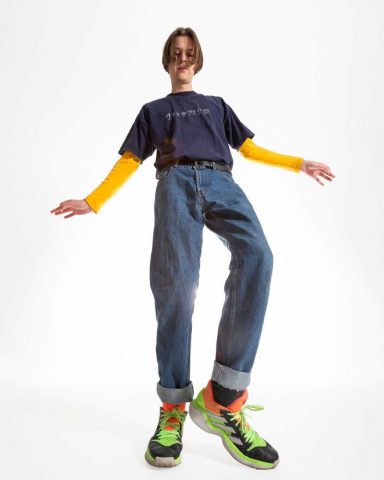Sometimes the video store in Marieville, Québec (about 40 minutes east of Montréal), would receive compact discs, those precious pieces of plastic that once had the power to reveal an entire universe to someone, and occasionally even open the doors to their future. “The video store in Marieville survived more than a majority of others. I vividly remember its checkered flooring. I remember the employees were eccentrics,” says Thierry Larose, paying tribute to these oases of culture that were, before the advent of streaming platforms, these places inevitably impregnated with the smell of fluorescent yellow popcorn.
 But why are we talking about the video store in Marieville, a quaint little town in the outskirts of Montréal? Because that’s where Larose grew up. And because his first album, Cantalou, opens with a song, “Club vidéo,” which is to this record what “La Monogamie” was to Trompe-l’œil by Malajube: a thirsty, tragic, and intoxicating fresco, tortuous yet celebratory, balancing murmurs with roaring guitars, in which the singer announces – with a remarkable sense of unforgettable method – that he’s not the kind of person who’ll tolerate banality.
But why are we talking about the video store in Marieville, a quaint little town in the outskirts of Montréal? Because that’s where Larose grew up. And because his first album, Cantalou, opens with a song, “Club vidéo,” which is to this record what “La Monogamie” was to Trompe-l’œil by Malajube: a thirsty, tragic, and intoxicating fresco, tortuous yet celebratory, balancing murmurs with roaring guitars, in which the singer announces – with a remarkable sense of unforgettable method – that he’s not the kind of person who’ll tolerate banality.
As he sings, Étions-nous faits pour ce que la vraie vie nous propose/ Que faire de notre penchant pour le grandiose/ Quand tout autour nous rappelle à l’ordre et à l’habitude? / Viens on va se mettre un film” (Were we made for what real life has in store for us / What about our penchant for the grandiose / When everything around us begs for order and habit? / Come, let’s put a movie on).
“When the video store received batches of CDs, they sometimes came from Dare to Care/Grosse Boîte,” says the 23-year-old artist, referring to Malajube’s record label, which was also home to the artists La Patère rose and Avec pas d’casque. Today, it has been re-christened Bravo musique after Béatrice Martin bought it, and Cantalou is the first official release of the new label. At the same time, the pre-teen Larose was a devout listener of the Radio-Canada’s Bande à part sessions, and the show Mange ta ville, hosted by Catherine Pogonat, which allowed him to explore the teeming local Montréal scene by proxy. “I dreamt about it all!” he says.
“The minute I saw the Dare to Care/Grosse Boîte logo on a CD at the video store, I knew I’d most likely like it. I bought Trois chaudières de sang [Avec pas d’casque’s first album] and I remember thinking it was so raw that it was unbelievable someone had released that on CD, and that I could do that too. It’s incredible that it made it to Marieville among all the Michel Louvain and Patrick Norman.”
After a two-year stint at the University of Sherbrooke in English studies, Larose took the opportunity presented by an internship in Montréal to seriously tackle songwriting. He participated in the 2019 Francouvertes with little stage experience, but an undeniable instinct for choruses that settled permanently in the minds of those who heard him – a rare quality that was noticed by Alexandre Martel. The latter musician, who has manned the console for Hubert Lenoir and Alex Burger, has now co-produced Cantalou.
“I asked Martel if we could go big and use all the good songs on side A and the rest later on,” says Larose, admitting that he applied the same approach as Malajube’s Trompe-l’oeil, which began with a bang before settling down halfway through, and ending on fireworks (“Rachel” and “Les éléphants” being Cantalou’s “Étienne d’août” and “St-Fortunat”).
Although the B-side of Cantalou – the most 2006-sounding record of 2021 – also contains its moments of grace, it had indeed been a long time since the first few tracks of an album had been as exhilarating as its 1- 2- 3-4 punch: “Club vidéo,” followed by the gumball grunge of the title track, then the heady “Les amants de Pompéi,” and “Chanson pour Bérénice Einberg” – this last a kind of “Ducharmian” fan fiction piece dedicated to the glory of the main character of L’avalée des avalés (translated twice as both The Swallower Swallowed and Swallowed). “It’s a 100 percent sincere love letter to someone who doesn’t actually exist,” giggles Larose, a savvy lyricist who knows how to evoke a lot while saying little.
“Ben non, moi non plus j’pleure jamais voyons donc” (“Of course I never cry”), he sings on Cantalou, with something in his voice hinting at the fact that the truth lies elsewhere, a trick he borrowed from Leonard Cohen. “The first time I heard such a thing was in ‘Chelsea Hotel #2,’ when he says, ‘That’s all, I don’t think of you that often,’ and you totally get that it’s so not true. I love it,” says Larose
So, what are we to do with our penchant for the grandiose when everything calls us back to order and habit at the moment? “Watch movies,” says the man who claims to have been influenced by filmmaker Richard Linklater – specifically, the bittersweet notes of his Before trilogy. “The next best thing when you don’t have access to the grandiose is fiction. That’s what I always fall back on. Writing temporarily fills that void for me, and when something grandiose happens for real, I feel like it was worth the wait.”